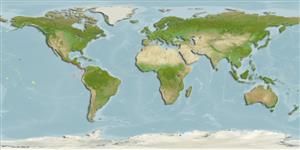>
Eupercaria/misc (Various families in series Eupercaria) >
Haemulidae (Grunts) > Haemulinae
Etymology: Anisotremus: Greek, anisos = unequal + Greek, trema, -atos = hole (Ref. 45335).
More on authors: Jordan & Gilbert.
Environment: milieu / climate zone / depth range / distribution range
Ecologie
marien demersaal. Tropical; 25°N -
Eastern Pacific: Mexico to Peru.
Grootte / Gewicht / Leeftijd
Maturity: Lm ? range ? - ? cm
Max length : 30.0 cm TL mannelijk / geslacht onbekend; (Ref. 9114); common length : 25.0 cm TL mannelijk / geslacht onbekend; (Ref. 9114)
Body compressed and deep (depth contained 2.0 to 2.1 times in standard length); mouth small and terminal with thick, fleshy lips; dorsal fin with 12 spines and 15 to 16 soft rays (XII, 15-16); pectoral fins slightly longer than head, reaching origin of anal fin; lateral line with 50 to 54 scales; scale series above lateral line parallel to it; body entirely golden gray with an indistinct dark stripe from nape to base of pectoral fins; flanks indistinctly striated; pelvic fins almost black (Ref. 55763).
Benthic over hard, rock and rubble bottoms (Ref. 9114). Marketed fresh (Ref. 9114).
Levenscyclus en paargedrag
Maturiteit | Voortplanting | Paaien | Eieren | Fecunditeit | Larven
Distinct pairing during breeding (Ref. 205).
McKay, R.J. and M. Schneider, 1995. Haemulidae. Burros, corocoros, chulas, gallinazos, roncos. p. 1136-1173. In W. Fischer, F. Krupp, W. Schneider, C. Sommer, K.E. Carpenter and V. Niem (eds.) Guia FAO para Identification de Especies para lo Fines de la Pesca. Pacifico Centro-Oriental. 3 Vols. FAO, Rome. (Ref. 9114)
Status op de Rode Lijst van het IUCN (Ref. 130435)
Gevaar voor de mens
Harmless
Gebruik door de mens
Visserij: van minder commercieel belang
Meer informatie
ReferentiesAquacultuurAquacultuurprofielKweeklijnenGeneticaElectrophoresesErfelijkheidZiektesVerwerkingNutrientsMassaconversie
Tools
Speciale rapporten
Download XML
Internetbronnen
Estimates based on models
Preferred temperature (Ref.
123201): 23.4 - 29.1, mean 27.9 °C (based on 209 cells).
Fylogenetische diversiteitsindex (Ref.
82804): PD
50 = 0.5039 [Uniqueness, from 0.5 = low to 2.0 = high].
Bayesian length-weight: a=0.01738 (0.00807 - 0.03743), b=3.02 (2.83 - 3.21), in cm total length, based on LWR estimates for this (Sub)family-body shape (Ref.
93245).
Trofisch niveau (Ref.
69278): 3.4 ±0.5 se; based on size and trophs of closest relatives
Weerstandsvermogen (Ref.
120179): Gemiddeld, minimale populatieverdubbelingstijd 1,4-4,4 jaar (Preliminary K or Fecundity.).
Fishing Vulnerability (Ref.
59153): Low vulnerability (20 of 100).
Nutrients (Ref.
124155): Calcium = 146 [38, 323] mg/100g; Iron = 1.09 [0.56, 2.23] mg/100g; Protein = 18.1 [16.2, 20.1] %; Omega3 = 0.167 [0.081, 0.326] g/100g; Selenium = 42.8 [21.7, 88.2] μg/100g; VitaminA = 17 [6, 50] μg/100g; Zinc = 1.07 [0.70, 1.61] mg/100g (wet weight);
